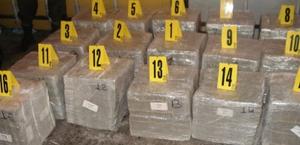Border securityMoney smuggling across border grows despite increased enforcement
U.S. and Mexican law enforcement authorities only seize about 1 percent of cash from drug trafficking, despite increased efforts by both countries; stemming the flow of cash is vital to efforts by the United States and Mexico to take down drug cartels, as drug cartels depend on cash from wholesale drug sales to gangs in the United States

Bundled cash captured by ICE agents // Source: dhs.gov
After Obama signed a $600 million border security bill into law earlier this month, security experts cautioned it was not enough to prevent spillover violence in the United States. from Mexican drug cartels. Elise Foley writes that experts argued the cartels, which have been engaged in bloody turf wars in Mexico for years, are the primary threat to safety along the border, and additional Border Patrol agents will not be sufficient to stop them from trafficking drugs and cash in and out of the country.
On Wednesday, the Washington Post came out with a figure that shows the scope of the drug enforcement problem. U.S. and Mexican law enforcement authorities only seize about 1 percent of cash from drug trafficking, despite increased efforts by both countries:
Since the two countries pledged to bolster joint operations in March 2009 and began searching more vehicles heading south, customs agents have seized record amounts of cash – not only in vehicles but also hidden in children’s toys, loaves of bread and body cavities.
But authorities are barely making a dent in the cartel profits. U.S. agents captured $85 million in illicit cash along the southwest border last year, according to the Department of Homeland Security. Mexican inspectors have seized $31 million in suspicious cash at all ports of entry into the country over the past three years, according to figures provided by the Mexican customs agency. In two years of undercover operations targeting Mexican cartels in the United States, the DEA seized $216 million, although it is unclear how much of that would have been smuggled south.
Cash smuggling is difficult to catch, and customs agents often face threats and attempts at corruption by drug cartels, the Post reported. Mexico has stepped up its customs efforts by increasing salaries and subjecting inspectors to lie-detector tests and monitoring by surveillance cameras. Drug cartels, however, continue to drive out inspectors: The Post reports thirty agents resigned in a Mexican customs office after several co-workers were killed.
Stemming the flow of cash is vital to efforts by the United States and Mexico to take down drug cartels, Bob Killebrew, a fellow at the Center for a New American Security (CNAS), told Foley in a recent interview. Drug cartels depend on cash from wholesale drug sales to gangs in the United States. Without it, they become more desperate and branch out into money-making measures with a less visible paper trail, such as kidnapping, he says.
“We need to reduce the money going to the cartels,” said Killebrew, the author of a CNAS report on national security and criminal drug networks that will be released in September. “As they strain to make more money, they’re more visible to law enforcement and can be knocked off.”
